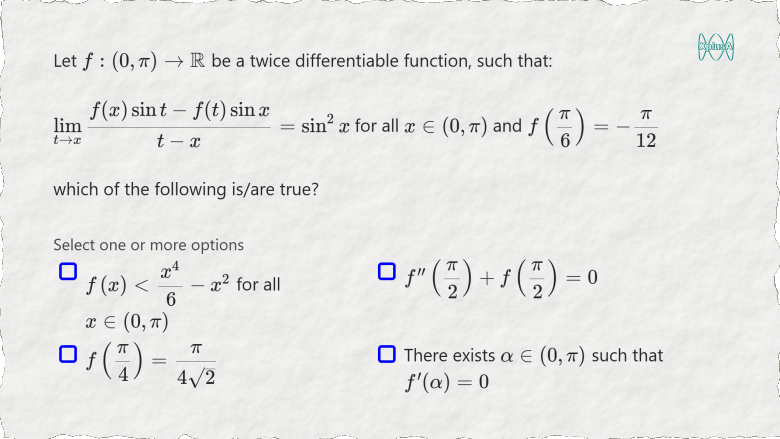A Relatively Harder Problem From JEE 2018

This problem appeared in the JEE Advanced, which is presumably one of the toughest exams in the world. You can try this problem live or just view the solution here.
-----------book page break-----------
Given that:
$\lim\limits_{t \rightarrow x} \dfrac{f(x) \sin t - f(t) \sin x}{t - x} = \sin^2 x$
Since the bottom limit tends to $0$, and the limit exists, we can apply L'Hopital's rule and the derivative of the numerator will also be $0$
Differentiating the numerator w.r.t $t$ and equating it to $0$, we get:
$\lim \limits_{t \rightarrow x}\dfrac{\dfrac{d}{dt} \left(f(x) \sin t - f(t) \sin x \right)}{\dfrac{d}{dt}(t-x)} = \sin^2 x$
$\Rightarrow \lim \limits_{t \rightarrow x}\dfrac{f(x) \cos t - f'(t) \sin x}{1} = \sin^2 x$
$\Rightarrow f(x) \cos x - f'(x) \sin x = \sin^2 x$
$\Rightarrow \dfrac{f(x) \cos x - f'(x) \sin x}{\sin^2 x} = 1$
$\Rightarrow \dfrac{d}{dx} \left( \dfrac{f(x)}{\sin x} \right) = 1$
-----------book page break-----------
$\Rightarrow -\dfrac{f(x)}{\sin x} = x + C$
$\Rightarrow f(x) = -x \sin x - C \sin x$
Substituting $x = \dfrac{\pi}{6}$ we get:
$f\left( \dfrac{\pi}{6} \right) = - \dfrac{\pi}{6} \left( \dfrac{1}{2} \right) - \dfrac{C}{2} $
$\Rightarrow -\dfrac{\pi}{12} = -\dfrac{\pi}{12} - \dfrac{C}{2} $
$\Rightarrow C = 0$
$\therefore f(x) = -x \sin x$
$f\left( \dfrac{\pi}{4} \right) = -\left( \dfrac{\pi}{4 \sqrt{2}} \right)$
$\therefore $ The first option is wrong
$f'(x) = -x \cos x - \sin x = 0$
$\Rightarrow -x \cos x = \sin x$
$\Rightarrow \tan x = -x$
-----------book page break-----------
$\tan x$ is in the range $(-\infty, 0)$ for $x \in \left(\dfrac{\pi}{2}, \pi \right)$
Therefore, the curve of $\tan x$ and the line $y = -x$ has to intersect at some point in this range.
The above has a solution in the domain $x \in (0, \pi)$ (specifically in the second quadrant).
$\therefore$ The second option is correct
$f''(x) = x \sin x - \cos x - \cos x$
$\Rightarrow f'' \left( \dfrac{\pi}{2} \right) = \dfrac{\pi}{2}$
$\Rightarrow f \left( \dfrac{\pi}{2} \right) = -\dfrac{\pi}{2}$
$\therefore f'' \left( \dfrac{\pi}{2} \right) + f \left( \dfrac{\pi}{2} \right) = 0$
$\therefore$ The third option is correct.
For the last option we need to check:
$-x \sin x \lt \dfrac{x^4}{6} - x^2$ for all $x \in (0, \pi)$
$\Rightarrow x \sin x + \dfrac{x^4}{6} - x^2 \gt 0$ $(\because x > 0)$ in the given domain.
$\Rightarrow \sin x + \dfrac{x^3}{6} - x \gt 0$
-----------book page break-----------
Let $\sin x + \dfrac{x^3}{6} - x = g(x)$
$\therefore g(0) = 0$
$g'(x) = \cos x + \dfrac{x^2}{2} - 1$
$\therefore g'(0) = 0$
$g''(x) = - \sin x + x$ and $g''(0) = 0$
And finally we have:
$g'''(x) = -\cos x + 1 = 1 - \cos x$ and $g'''(0) = 0$
In the given domain $x \in (0, \pi)$ $g'''(x)$ is positive.
Therefore, $g''(x)$ is increasing in the given domain.
$g''(0)$ is $0$ and $g''(x)$ is increasing, therefore, $g''(x)$ is also positive in the given domain.
Similarly, since both $g'(0)$ and $g(0)$ are zeros, we can show that $g'(x)$ is positive in the given domain and so is $g(x)$
Therefore, the fourth option is also correct.